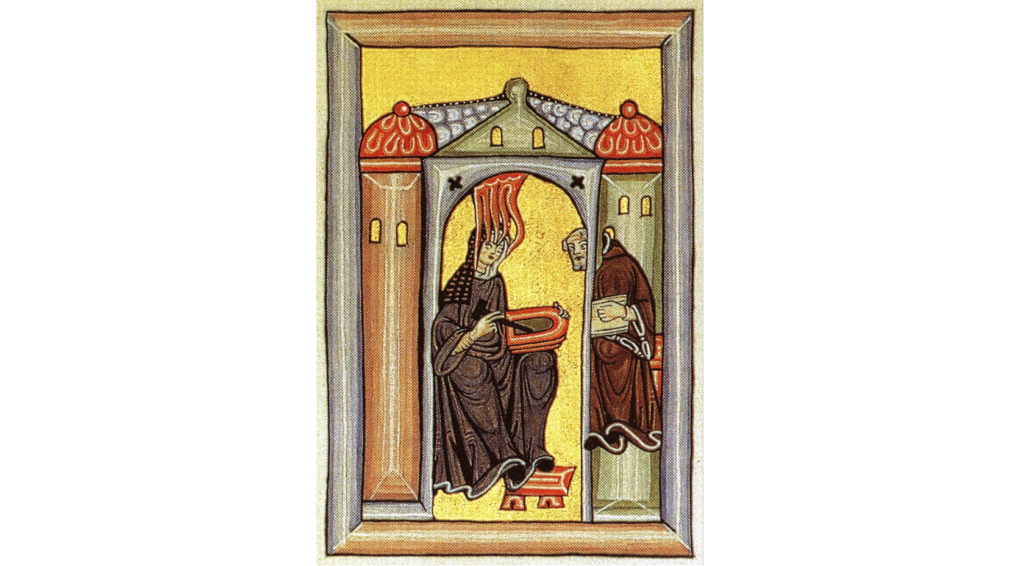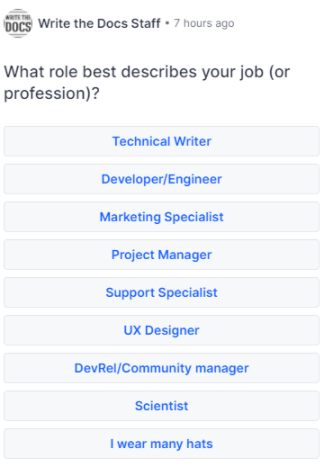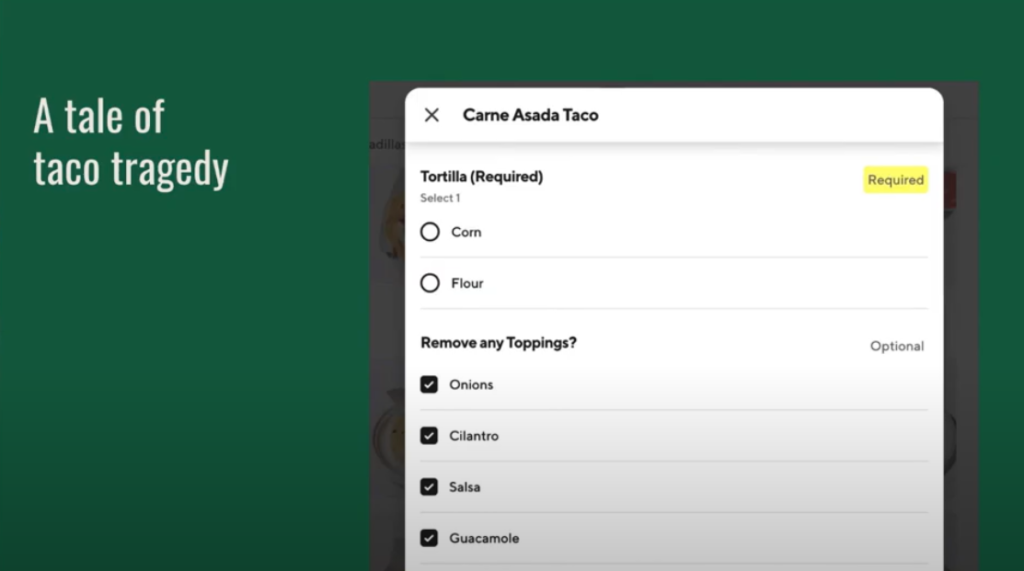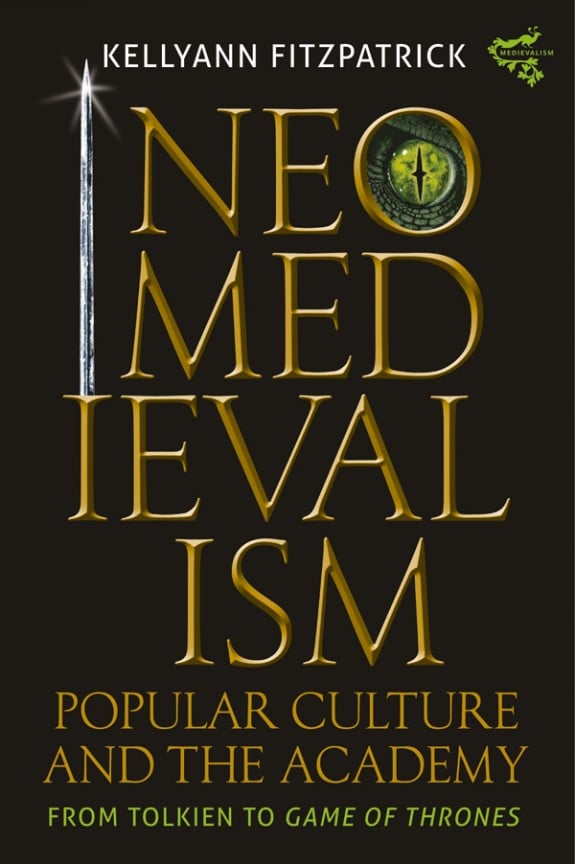Write the Docs Portland 2021 Conference edition: about the conference; recordings; sketchnotes; a Writing Day; the Good Docs project; medievalists at WTD; a taco tech comm fail

Late April/early May 2021 is prime virtual conference season (at least in tech, and also for medievalists, medievalism scholars, etc.). The downside: for an analyst like myself, there seems to be an expectation that I will attend all the events. The upside: with careful planning around other obligations, I was able to catch most of the Write the Docs Portland 2021 Conference.
Taking advantage of virtual conference formats (and different time zones) to catch both #RHSummit and #writethedocs today. pic.twitter.com/z9H54tbn0o
— Dr KellyAnn Fitzpatrick (@drkellyannfitz) April 27, 2021
This was my first Write the Docs conference–based on the conference chat, it seems that there were a number of other first-time attendees–and the experience made me wish that I had found a way to attend one earlier. And while it is impossible to cover every aspect of an event, I’ve gathered some of my impressions and takeaways (an entire Docs Roundup post’s worth) below.
About the Conference
As an organization, Write the Docs (WTD) describes itself as “a global community of people who care about documentation.” Conferences are only one of several types of events and resources it organizes for its community; other efforts include meetups, relevant surveys, a jobs board, and guides on everything from style to organizing to hiring.
Along with everyone else, WTD moved its conferences from in-person to virtual in 2020 due to the COVID-19 pandemic, so the Portland 2021 organizers had the benefit of lessons learned from earlier virtual events. Per the event recap, the event’s 700 registrants marked the highest attendance numbers yet for a WTD conference and ensured a healthy number of participants for conference activities. These included
- a single-track main stage, with pre-recorded talks followed by live speaker Q&A
- lightning talks (submitted, accepted, and then delivered during the conference)
- a writing day (more below)
- a hallway track (virtual spaces for unstructured socializing)
- an unconference (participant-driven spaces for maybe structured, maybe not structured, interactions)
- an evening social event
- an expo
- a career fair
- a hiking day
The full schedule is currently still available on the conference website. It is also worth noting that the majority of conference activities took place on Hopin, which is becoming one of my favorite virtual event platforms (strictly from my own very limited end user perspective).
There was fairly lively discussion on the event and session chat, and organizers also used the platform to run a number of polls. One involved asking attendees “What role best describes your job (or profession)?”

While WTD focuses on documentation (and has adopted the excellent term “documentarians” to refer to documentation practitioners in general), the poll options (Technical Writer, Developer/Engineer, Marketing Specialist, Project Manager, Support Specialist, UX Designer, DevRel/Community manager, Scientist, and–my personal favorite–”I wear many hats”) reflect a sharp awareness that a) not everyone who works on documentation is necessarily a professional tech writer and b) good documentation is increasingly recognized as an essential component to professions outside of the tech writer/tech communicator designation.
Talk Recordings
Recordings of the main stage and lightning talks, along with opening and closing remarks from WTD co-founder Eric Holscher, have been curated into a conference playlist on the WTD YouTube channel. Recordings from select previous events are also available.
Sketchnotes
As an attendee who often had to divide my attention among overlapping obligations, I very much appreciated the sketchnotes Linette Voller provided for each of the main stage talks. For those unfamiliar with sketchnotes, I recommend Jennifer Hartnett-Henderson’s 2013 WTD talk, “Sketchnotes: Communicate Complex Ideas Quickly,” (thank you to Jay Elmore for surfacing the link), as well as Voller’s own lightning talk, “5 Steps Towards Making Sketchnotes,” from the WTD Australia & India 2020 conference.
If the reactions to the sketchnotes for the first talk are any indication, I was not the only attendee who appreciated them (and it turns out that sketchnotes can be extremely useful for presenters as well):
this is AMAZING https://t.co/TT7ZMCglex
— deanna.cs (@itsdeannat) April 26, 2021
I 💜 when conferences do this. This is super neat to have as a speaker. It clarifies the points you are making to your audience—lots to learn for next time. While also being an adorable "trophy" for your hard work! https://t.co/xdUzhKjT2l
— Tessa Kriesel (@tessak22) April 26, 2021
Because I could find the main talk sketchnotes only on Twitter (and because it would be remiss of a roundup post to merely mention talks and videos and sketchnotes without doing any actual rounding up), here are links to the sketchnotes and recordings for each of the main stage talks at the WTD Portland 2021 conference (presented in the same order as they appear in the conference schedule):
- Jessica Garson, “Writing a perfect technical tutorial” sketchnotes & recording
- Daniele Procida, “Always complete, never finished” sketchnotes & recording
- Abigail McCarthy, “A guide to getting started in open source” sketchnotes & recording
- Sarah R. Rodlund, “Beyond metrics: Using maturity models to develop a docs strategy” sketchnotes & recording
- Rachael Miller Stavchansky, “Shuffle ball change: Sashay your way to clearer API documentation” sketchnotes & recording
- Swapnil Ogale, “Putting the ‘tech’ in technical writer” sketchnotes & recording
- Paris Buttfield-Addison, “The Secret History of Libraries” sketchnotes & recording
- Laura Novich, “Documentation Communities: Sound Strategy or Documentarian’s Gambit?” sketchnotes & recording
- Deanna Thompson, “Building a style guide from the ground up: lessons learned from a lone writer” sketchnotes & recording
- Falon Darville, “Almost None to Some: Driving DISQO’s Doc Culture as a Solo Documentarian” sketchnotes & recording
- Ines Stefanovic, “Is Tech Writer a Tester, and Vice Versa, Is Tester a Tech Writer?” sketchnotes & recording
- Rin Oliver, “Writing Documentation with Neurodivergent Open Source Contributors In Mind” sketchnotes & recording
- Katherine Karaus, “Invisible influence — the documentation behind UX copy” sketchnotes & recording
- Nicola Yap, “Level Up: Onboarding that enables writers to thrive” sketchnotes, recording, & Writing onboarding toolkit mentioned in the talk (available via Google Open Source)
A Writing Day
When WTD conferences were held in person, during the Writing Day folks would gather at designated tables to collaborate on specified writing projects (or in some cases, just sit together and work on individual writing). The virtual version was pretty similar, with virtual “tables” set up in Hopin that allowed up to 20 participants to interact on video and any number of participants to interact on the table’s chat. There were separate morning and afternoon sessions, with projects running for one or both sessions. Participants could freely drop in on the table for whatever project(s) they wanted to work on or learn more about.
While I selfishly used this time to catch on some writing tasks for work, it was nice to do so while chatting with attendees on both the main conference event chat and the WTD Slack, and to know that I was not writing alone (the camaraderie was especially important considering it was a Sunday).
However, I also took note of some of the projects available at different tables. WTD had a table to “curate and improve” its existing style guide resources. Other options included a public-facing styleguide from MongoDB, the Trino project, an introduction to contributing to docs at Wikimedia, and the Good Docs project.
Notably, GitLab hosted a table for contributing to their open source docs, and was very explicit about also being willing to help attendees get started with Git; when I checked real-time session attendee numbers (per the Hopin UI), GitLab’s table had the most attendees present. This aligns with a larger interest in learning Git expressed by attendees via chat and hallway track discussions. As many docs setups move away from WYSIWYG editors to processes that involve committing docs changes (usually in markdown) as one would any other code change, Git will become an increasingly marketable skill among documentarians. Also related: Garret Griffith’s lightning talk “Git Basics for a Non-Technical Audience”.
The Good Docs Project
The Good Docs Project was one of the Writing Day table options, but it is worth calling out the project specifically, as I had not heard of it until it popped up in a draft of Abigail McCarthy’s slides for her talk “A guide to getting started in open source.” (As I note in Docs Roundup 2.0, Abigail is a former tech writing colleague who is currently at VMware, and I am not surprised at all by how much I learned from her excellent talk.)
The stated purpose of the Good Docs Project:
The goal of the Good Docs Project is to improve open source software documentation by providing high quality templates and writing instructions to the open source community and beyond.
The group has a collection of templates (organized under its GitHub project) available for use, but also has guidelines, working groups, and a Slack workspace for folks who want to contribute to the project. One thing I like: a very visible and easy to find page on licenses for related resources, which also includes suggested attribution language and contributor agreement information.
Miscellany
- One of my favorite talks from the event: Rin Oliver on “Writing Documentation with Neurodivergent Open Source Contributors In Mind,” which outlines the importance of (and strategies for) making open source and documentation communities more equitable and welcoming for folks who are neurodivergent. Another great aspect of their talk: an invitation to challenge them to a bakeoff throwdown.
- There are a lot of bakers at WTD. From conference bread tweets to Rin Oliver’s bakeoff throwdown invitation to Abigail McCarthy’s perfect banana bread recipe quest (noted in her speaker introduction), I fully expect some kind of baking component in future WTD events.
- WTD has a book club! Check out Amoreen Armetta’s lighting talk on “WTD Book Club”, and then maybe join the #learn-tech-writing channel (where the WTD book club lives) on the WTD Slack.
- One more lightning talk recommendation (but really, try to watch them all): Lisa Gay on “The Nuts and Bolts, Literally: Documenting Hardware”, which also covers printed doc scenarios, safety concerns, and “users having fundamentally different paradigms.”
- I learned that I was not the only medievalist at WTD Portland 2021. Paris Buttfield-Addison, who spoke on The Secret History of Libraries, has a master’s degree in medieval history; a number of other attendees mentioned in the session chat that they had a background or current interest in medieval studies.
- Write the Docs Prague 2021 will take place remotely on October 3-5.
- Write the Docs Australia & India 2021 will take place remotely on December 2-3.
Worth 1000 words
From Katherine Karaus’s talk on “Invisible influence — the documentation behind UX copy”; an excellent example of why UX copy is important (i.e., what does a user do if they want toppings?):

Have a recent/upcoming docs item you want me to know about? Drop me a line or find me on Twitter.
Disclosure: GitLab, Google Cloud, MongoDB, and VMware are all RedMonk clients.
Image information: miniature of Hildegard of Bingen (author unknown) from Wikimedia Commons; image is in the public domain. Per the Medieval Tech Comm section of Docs Roundup 1.2: “although Hildegard is more widely known for her contributions to music and theology, she is also considered a medieval technical communicator.” Also, she was clearly using tablets way before they were “a thing”.

No Comments